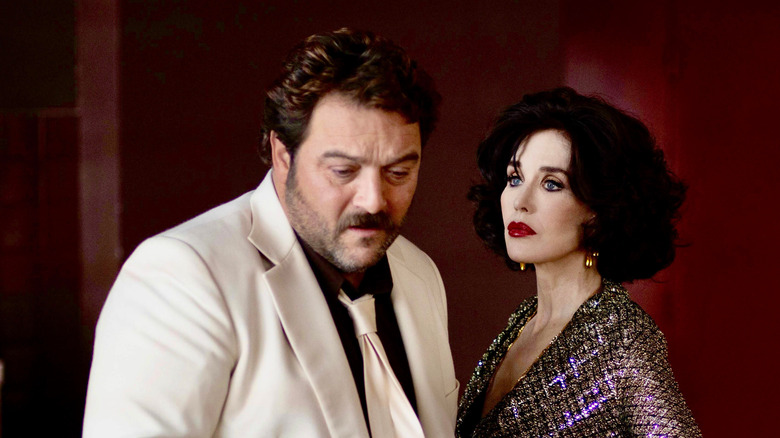Peter Von Kant Review: A Moody, Melodramatic Chamber Piece [London Film Festival]
Peter (Denis Ménochet) is a famous filmmaker living in Cologne, Germany in the 1970s. He lives in a beautiful, colorful apartment with his assistant Karl (Stefan Crepon), a tall, thin, mustachioed man who dutifully does everything asked of him, all while never saying a word. Peter is hard at work on his next script — or not so hard, as he seems to spend most of his time lounging around, drinking, and listening to music while Karl types away. While his professional life is extremely successful, his personal life is far less so. There's an emptiness eating away at his soul — despite having it all, he has nobody to share it with. That might change, however, when a gorgeous young man appears at his door, at the request of his friend, who might finally make Peter's life bearable.
If this all sounds a bit familiar to you, then you're onto something. François Ozon's "Peter Von Kant" is a remake of Rainer Werner Fassbinder's brilliant 1972 melodrama "The Bitter Tears of Petra Von Kant." Fassbinder's film is also about the titular character's relationships with their silent assistant and a young ingenue and their toxic romance, though in that film's case, all the main characters are female. Ozon's film is essentially a gender-flipped remake. It's an interesting experiment, as the characters, dialogue, and scenes feel familiar here, yet "Peter Von Kant" is distinct from "Petra," and is a mere 80-odd-minutes compared to Fassbinder's two-hour film.
It's rather odd that Ozon would remake such a film, but there's a wonderful sort of kinship in a major openly gay European filmmaker remaking the work of another major gay director that came before him. It's almost as if Ozon has a kindred spirit in Fassbinder, and this is the kind of film that had me wondering what kind of magic these titans would have possibly made together had Fassbinder still been alive. "Peter Von Kant" feels almost fetishistic in the way it covets Fassbinders 1972 classic — Ozon's film, not coincidentally, is set in the same year. This is a very passionate, erotic film, with characters lustfully glancing at each other, knowing stares that practically say "I know all of your secrets."
It's sexy, but it simmers with rage, bitterness, and frustration. Peter himself is a towering presence — at the beginning of the film, he speaks to his friend, actress Sidonie (Isabelle Adjani, wearing a wig that recalls a character in "Petra Von Kant"). She's back in town after working on films in America and has come to comfort Peter over his latest failed relationship. Peter sounds equally obsessed and furious over losing his relationship, revealing all too intimate details to Sidonie, who would really rather not hear them. It's clear that Peter is in no state to even imagine pursuing another romantic relationship, but lust and desire are funny like that — they really don't care what you think and are happy to overtake every reasonable thought in your brain.
A stifling desire
It's mere moments later that Amir (Khalil Ben Gharbia) arrives at Peter's door. A friend of Sidonie, Amir is keen to make it as an actor. He's got boyish good looks and beautiful curly hair, and Peter is immediately smitten. As a successful film director, Peter has every opportunity to make a star out of Amir, but he's far more interested in seducing him. There's certainly an attraction on Peter's side, but whether there's a genuine passion for Amir is something that remains a mystery throughout "Peter Von Kant." Regardless, the two become romantically intertwined, and it's not long before Peter dreams up an entirely new film with Amir as the star.
Some time has passed, and the film has been made, with Amir's dreams of being a rising star come true. He's still with Peter, but it's clear something is different now. The two seem to have nothing but contempt for each other. A physical desire is still there, and Peter is certainly in love with Amir, but the two trade barbarous insults and shout and scream at each other. Peter is extremely oppressive, and Amir feels trapped, and it's a toxic relationship, all observed quietly by Karl, who may have an infatuation of his own.
This is a gorgeously made film. Ozon's attention to detail has always been key to his work, and you can always rely on him for a sharp, intriguing style. As we spend the entire film in Peter's apartment, there's a genuine challenge to keep a single location interesting. I've always found myself drawn to films set in a single place, and how directors make use of such limited locations is fascinating to me. Cinematographer Manuel Dacosse (a frequent collaborator of Ozon) expresses the vastness of Peter's apartment (he is very successful, after all), but it always manages to feel claustrophobic and almost suffocating. It perfectly mirrors Peter's inner turmoil, always feeling lonely and restricted despite surrounding himself with beautiful men.
Peter's bitter tears
While "Peter Von Kant" gets progressively nasty as it goes on as characters say increasingly awful things they can never take back, it's never anything but beautiful to look at. Shots are thoughtfully composed, and every moment bursts with color. Peter's apartment is decorated to perfection, filled with vivid colors, right down to the purple satin sheets on his bed, which rests upon an outrageous white fur rug. Other details add a visual and comical flair, including Sidonie having a compartment in her makeup compact for cocaine. Despite being quite nasty and miserable, it's a frequently funny film. His walls are covered with images of beautiful men, and later on, images of Amir are everywhere. It's a thoughtful detail that leads to a striking realization — Amir wasn't the first impossibly beautiful man Peter has fallen head over heels for, and he certainly won't be the last. After all, those who can't understand their errors are doomed to repeat them.
There's definitely a valid question as to who this film is for. It is a movie so completely indebted to another film — would someone who has never seen, or even heard of "The Bitter Tears of Petra Von Kant" find something to enjoy here? There's an easy answer to that, and it's a resounding yes. I myself had never seen Fassbinder's film before seeing Ozon's, though I was familiar with the gist of it (this has now been rectified, and I'm so glad it has. It's an extraordinary film).
Thankfully, there's a lot to enjoy in "Peter Von Kant." It's a moody, meditative melodrama, an exciting psychological character study, the type that doesn't get made anymore. It's 1970s setting makes all the more sense when you realize it's been that long since this kind of movie was made regularly. While it does occasionally feel a little too one-note and repetitive, even in its brief runtime, a host of wonderful performances, meticulous set detailings, and expertly claustrophobic cinematography make "Peter Von Kant" worthwhile.
/Film Rating: 7 out of 10


